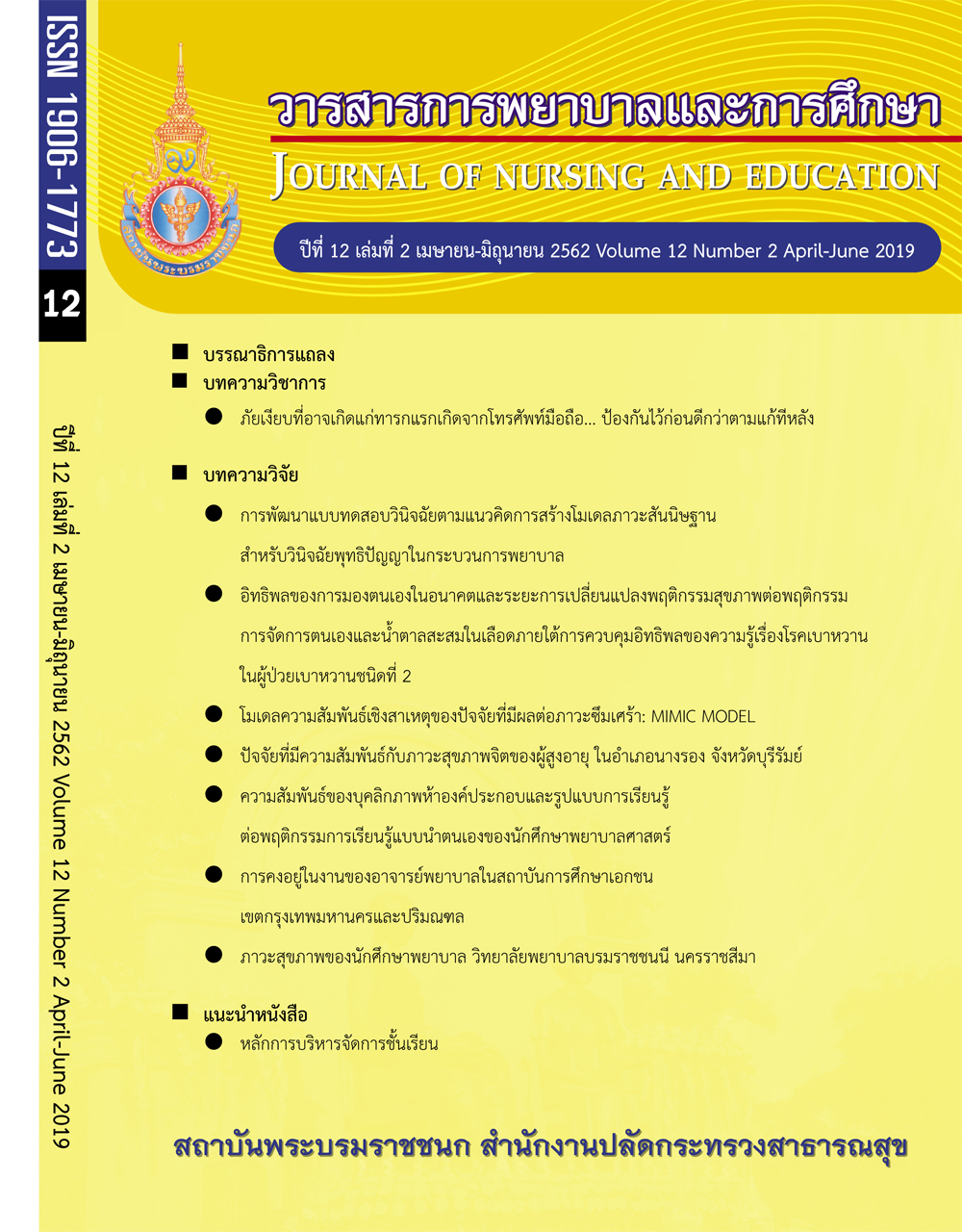อิทธิพลของการมองตนเองในอนาคตและระยะการเปลี่ยนแปลง พฤติกรรมสุขภาพต่อพฤติกรรมการจัดการตนเองและนำ้าตาลสะสม ในเลือดภายใต้การควบคุมอิทธิพลของความรู้เรื่องโรคเบาหวาน ในผู้ป่วยเบาหวานชนิดที่ 2
อิทธิพลของการมองตนเองในอนาคตและระยะการเปลี่ยนแปลง พฤติกรรมสุขภาพต่อพฤติกรรมการจัดการตนเองและนำ้าตาลสะสม ในเลือดภายใต้การควบคุมอิทธิพลของความรู้เรื่องโรคเบาหวาน ในผู้ป่วยเบาหวานชนิดที่ 2
คำสำคัญ:
การมองตนเองในอนาคต, ระยะการเปลี่ยนแปลงพฤติกรรม, การจัดการตนเอง เบาหวานชนิดที่ 2, น้ำตาลสะสมในเลือดบทคัดย่อ
บทคัดย่อ
การปรับเปลี่ยนพฤติกรรมของบุคคลให้ประสบความสำเร็จนั้น ต้องอาศัยแรงจูงใจและความพร้อม
ในการปรับเปลี่ยนพฤติกรรม การวิจัยภาคตัดขวางครั้งนี้มีวัตถุประสงค์เพื่อศึกษา 1) ผลของการมอง
ตนเองในอนาคตต่อพฤติกรรมการจัดการตนเองและน้ำตาลสะสมในเลือดภายใต้การควบคุมอิทธิพล
ของความรู้เรื่องโรคเบาหวาน 2) ผลของระยะการเปลี่ยนแปลงพฤติกรรมสุขภาพต่อการจัดการตนเอง
และน้ำตาลสะสมในเลือดภายใต้การควบคุมอิทธิพลของความรู้เรื่องโรคเบาหวาน และ 3) ผลของการมี
ปฏิสัมพันธ์ระหว่างการมองตนเองในอนาคตกับระยะการเปลี่ยนแปลงพฤติกรรมสุขภาพต่อการจัดการ
ตนเองและน้ำตาลสะสมในเลือดภายใต้การควบคุมอิทธิพลของความรู้เรื่องโรคเบาหวาน กลุ่มตัวอย่าง
เป็นผู้ป่วยเบาหวานชนิดที่ 2 ที่มารับการรักษาที่โรงพยาบาลส่งเสริมสุขภาพตำบล ในจังหวัดจันทบุรี
จำนวน 340 คน รวบรวมข้อมูลโดยใช้แบบสอบถาม ประกอบด้วย 1) แบบบันทึกข้อมูลส่วนบุคคล
2) แบบสอบถามการมองตนเองในอนาคต 3) แบบประเมินระยะการเปลี่ยนแปลงพฤติกรรมสุขภาพ
4) แบบประเมินพฤติกรรมการจัดการตนเอง และ 5) แบบวัดความรู้เรื่องโรคเบาหวาน เครื่องมือผ่านการ
ตรวจสอบโดยผู้ทรงคุณวุฒิ จำนวน 3 ท่าน และนำไปทดลองใช้กับผู้ป่วยโรคเบาหวานชนิดที่ 2 จำนวน
20 ราย ได้ค่าดัชนีความตรงเชิงเนื้อหาในช่วง 0.87 ถึง 1 และค่าความเชื่อมั่นในช่วง .76-.89 วิเคราะห์
ข้อมูลส่วนบุคคล ความรู้เรื่องโรคเบาหวาน พฤติกรรมการจัดการตนเองและน้ำตาลสะสมในเลือด
โดยใช้สถิติเชิงพรรณนา ได้แก่ ความถี่ ร้อยละ ค่าเฉลี่ย และส่วนเบี่ยงเบนมาตรฐาน และทดสอบสมมติฐาน
การวิจัย ใช้สถิติ Two Way MANCOVA
ผลการวิจัยพบว่า 1) การมองตนเองในอนาคตไม่มีผลต่อพฤติกรรมการจัดการตนเองและน้ำตาลสะสม
ในเลือด เมื่อควบคุมอิทธิพลของความรู้เรื่องโรคเบาหวาน (Wilks Lambda= .983, F = .856, p=.490)
2) ระยะการเปลี่ยนแปลงพฤติกรรมสุขภาพมีผลต่อพฤติกรรมการจัดการตนเองและน้ำตาลสะสมใน
เลือดเมื่อควบคุมอิทธิพลของความรู้เรื่องโรคเบาหวาน (Wilks Lambda= .776, F = 34.855, p <.001)
โดยมีผลอย่างมีนัยสำคัญทางสถิติต่อทั้งการจัดการตนเอง (F= 63.199, p<.001, hp2 = .206) และ
น้ำตาลสะสมในเลือด (F = 8.087, p=.005, hp2 = .032) และ 3) การมองตนเองในอนาคตและระยะ
การเปลี่ยนแปลงพฤติกรรมสุขภาพไม่มีปฏิสัมพันธ์ร่วมกันต่อการจัดการตนเองและน้ำตาลสะสมในเลือด
เมื่อควบคุมอิทธิพลของความรู้เรื่องโรคเบาหวาน (Wilks Lambda= .983, F = 1.032, p=.390)
ผลจากการวิจัยครั้งนี้แสดงให้เห็นว่าระยะการเปลี่ยนแปลงพฤติกรรมสุขภาพมีผลต่อพฤติกรรม
การจัดการตนเองและน้ำตาลสะสมในเลือด ดังนั้นบุคคลากรสุขภาพควรนำทฤษฎีระยะการเปลี่ยนแปลง
พฤติกรรมสุขภาพไปใช้ในการปรับเปลี่ยนพฤติกรรมสุขภาพของผู้ป่วยเบาหวานชนิดที่ 2 ในการควบคุม
ระดับน้ำตาลสะสมในเลือด
เอกสารอ้างอิง
1. International Diabetes Federation.
Diabetes Atlas (8thed.). Online version
of IDF Diabetes Atlas. [cited 2017
Dec 8]. Available from fle:///D:/My%
20Documents/Downloads/IDF_DA_
8e-EN-fnal.pdf.
2. Bureau of Non Communicable Diseases.
Annual report 2015. Bangkok: Offce
of the Veterans Organization Printing
Offce, under the Royal Patronage;
2016. (in Thai)
3. Mcleod ME. Care of Patients with Diabetes
Mellitus. In: Ignatavicius DD, Workman
LM, editors. Medical-Surgical Nursing:
Patient-Centered Collaborative Care
(6thed.). St.Louis: Saunders Elsevier;
2010. p. 1465-1525.
4. National Statistical Offce. Number of
Deaths Classifed by Cause of Death
and Sex 2007-2014. [cited 2017 April
1]. Available from http://thaincd.com/
information-statistic/non-communicabledisease-data.php?pn=2. (in Thai)
5. Bureau of Policy and Strategy Ministry
of Public Health. Summary of Illness
Report 2014. Bangkok: Offce of the
Veterans Organization Printing Offce,
under the Royal Patronage; 2015.
(in Thai)
6. Markus H, Nurius P. Possible Selves.
Am Psychol. 1986; 41(9), 954-69.
7. Prochaska JO, Velicer WF. The
Transtheoretical Model of Health
Behavior Change. Am J Health Promot.
1997; 12(1), 38-48.
8. Chapman-Novakofski K, Karduck J.
Improvement in Knowledge, Social
Cognitive Theory Variables, and
Movement Through Stages of Change
After a Community-Based Diabetes
Education Program. J Am Diet Assoc.
2005; 105(10), 1613-16.
9. Yu P, Xiao X, Wang L, Wang L. Correlation
between Self-Management Behaviors
and Blood Glucose Control in Patients
with Type 2 Diabetes Mellitus in
Community. J Cent South Univ (Med
Sci); 38(4), 425-31.
10. Rotheram-Borus MJ, Ingram BL,
Swendeman D, Adabel Lee A. Adoption
of Self-Management Interventions for
Prevention and Care. Prim Care. 2012;
39(4), 649–60.
11. Bains SS, Egede LE. Associations between
Health Literacy, Diabetes Knowledge,
Self-Care Behaviors, and Glycemic
Control in a Low Income Population
with Type 2 Diabetes. Diabetes Technol
Ther. 2011; 13(3), 335-41.
12. Suphunnakul P, Sirinual S, Chayodom
V, Singhadej, O. A Causal Relationship
Model of Factors Influencing Glycemic
Control among the Elderly with Type
2 Diabetes Mellitus in Sukhothai
Province, Thailand. J Pub Health Dev.
2017; 15(2), 31-42. (in Thai)
13. Hair Jr JF, Black WC, Babin BJ, Anderson
RE. ANOVA and MANOVA. Multivariate
Data Analysis: A Global Perspective
7ed. Upper Saddle River: Pearson
Education, Inc; 2010. p. 439 - 502.
14. Horneffer-Ginter K. Stages of Change
and Possible Selves: 2 Tools for
Promoting College Health. J Am Coll
Health. 2008; 56(4). 351-8.
15. Dunkel C, Kerpelman J. Possible Selves:
Theory, Research, and Application. NY:
Nova Science; 2006.
16. Hooker K, Kaus CR. Possible Selves and
Health Behaviors in Later Life. J Aging
Health. 1992; 4(3), 390-411.
17. Olarikkachat T, Jittanoon P, Srikeaw
M. The Effect of a Behavioral Change
Promotion Program on Health Behaviors
and Blood Lipid of Hotel Staff with
Hyperlipidemia. Songklanagarind
Journal of Nursing. 2016; 36(Sup),
99-116. (in Thai)
18. Cotrell V, Hooker K. Possible Selves of
Individuals with Alzheimer’s Disease.
Psychol Aging. 2005; 20, 285-94.
19. Aloise-Young PA, Hennigan KM, Leong
CW. Possible Selves and Negative Health
Behaviors during Early Adolescence. J
Early Adolescence. 2001; 21(2), 158-81.
20. Sattanako C, Sota C. Effects of Self
Management Program on Glycemic
Control in Patients with Type 2 Diabetes.
Journal of Nursing and Education. 2017;
10(4), 32-47. (in Thai)






